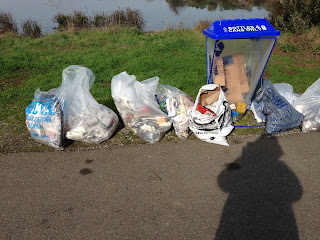Flotillas of birds skim the near distance, observing;
the shore being taken up by throngs of people
with buckets, bags and sticks.
the shore being taken up by throngs of people
with buckets, bags and sticks.
I wonder, do they judge us?
Do they scorn or laugh or jeer?
They’d be within their rights.
Do they scorn or laugh or jeer?
They’d be within their rights.
Bottle tops, cigarette butts, candy wrappers;
Plastic straws, seven left shoes, a tarp;
Coffee lids, condoms, a mitt for catchers.
Plastic straws, seven left shoes, a tarp;
Coffee lids, condoms, a mitt for catchers.
Packing peanuts, pills and partitions;
foam that will never break down into loam;
cosmetic jars, wine bottles, crushed can renditions.
foam that will never break down into loam;
cosmetic jars, wine bottles, crushed can renditions.
We sweep and we swarm,
picking through weeds and thorn,
to get at an old tire, wheel rusted and worn.
picking through weeds and thorn,
to get at an old tire, wheel rusted and worn.
The tide moves in, signaling our defeat,
as more bags and bottles drift, from farther out, in,
while all bag what was retrieved and retreat.
as more bags and bottles drift, from farther out, in,
while all bag what was retrieved and retreat.
The birds take to the cleaner shore,
ready to bask and snooze in the sun;
we leave, wishing we could do more.
ready to bask and snooze in the sun;
we leave, wishing we could do more.
This is both a penance and a futility,
even done each day forever, of a utility
useless to blot the sin of our pollution.
even done each day forever, of a utility
useless to blot the sin of our pollution.
Our penance is received, nevertheless;
one wonders if we can heal our world
by means of such feeble efforts;
napping birds make no answer, busy at rest.
one wonders if we can heal our world
by means of such feeble efforts;
napping birds make no answer, busy at rest.

